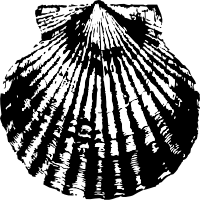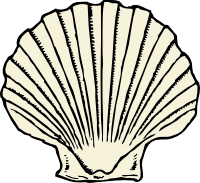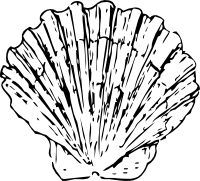Associations to the word «Scalloping»
Noun
- Clam
- Oyster
- Lobster
- Shrimp
- Breakout
- Mollusc
- Seafood
- Squid
- Crab
- Aquaculture
- Stitch
- Cucumber
- Octopus
- Shell
- Cod
- Tuna
- Fishery
- Mollusk
- Herring
- Sponge
- Hinge
- Salmon
- Maximus
- Sauce
- Spat
- Pilgrim
- Trout
- Roe
- Invertebrate
- Pollock
- Reversal
- Mushroom
- Acorn
- Salad
- Valve
- Fishing
- Pork
- Harvesting
- Catfish
- Rectangle
- Trend
- Saucer
- Fisherman
- Shark
- Median
- Emblem
- Aphrodite
- Mantle
- Apr
- Coral
- Fish
- Sturgeon
- Pm
- Pumpkin
- Sapphire
- Shallow
- Perch
- Eel
- Dish
- Lace
- Sep
- Loch
- Superfamily
- Tops
- Beef
- Predator
- Santiago
- Swim
Adjective
Adverb
Pictures for the word «Scalloping»
Wiktionary
SCALLOP, noun. Any of various marine bivalve molluscs of the family Pectinidae which are free-swimming.
SCALLOP, noun. A curved projection, making part of a decoration.
SCALLOP, noun. A fillet of meat, escalope.
SCALLOP, noun. A form of fried potato.
SCALLOP, noun. A dish shaped like a scallop shell.
SCALLOP, verb. To (be) cut in the shape of a crescent
SCALLOP, verb. (transitive) to make or cook scallops
SCALLOP, verb. (transitive) to bake in a casserole (gratin), originally in a scallop shell; especially used in form scalloped
SCALLOP, verb. (intransitive) to harvest scallops
SCALLOP THEOREM, noun. (fluid dynamics) A theorem which states that to achieve propulsion at low Reynolds number in simple (i.e. Newtonian) fluids, a swimmer must deform in a way that is not invariant under time-reversal.
SCALLOP THEOREMS, noun. Plural of scallop theorem
Dictionary definition
SCALLOP, noun. One of a series of rounded projections (or the notches between them) formed by curves along an edge (as the edge of a leaf or piece of cloth or the margin of a shell or a shriveled red blood cell observed in a hypertonic solution etc.).
SCALLOP, noun. Edible muscle of mollusks having fan-shaped shells; served broiled or poached or in salads or cream sauces.
SCALLOP, noun. Thin slice of meat (especially veal) usually fried or broiled.
SCALLOP, noun. Edible marine bivalve having a fluted fan-shaped shell that swim by expelling water from the shell in a series of snapping motions.
SCALLOP, verb. Decorate an edge with scallops; "the dress had a scalloped skirt".
SCALLOP, verb. Bake in a sauce, milk, etc., often with breadcrumbs on top.
SCALLOP, verb. Form scallops in; "scallop the meat".
SCALLOP, verb. Fish for scallops.
SCALLOP, verb. Shape or cut in scallops; "scallop the hem of the dress".
Wise words
Words are always getting conventionalized to some secondary
meaning. It is one of the works of poetry to take the
truants in custody and bring them back to their right
senses.







